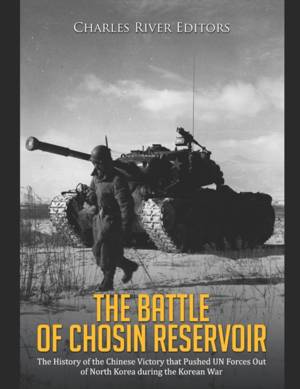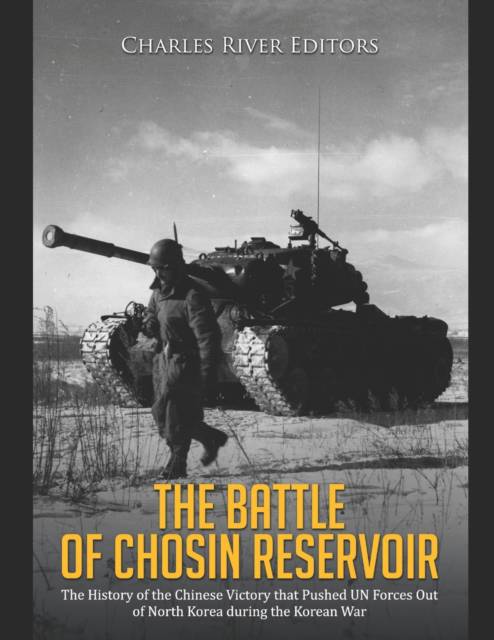
- Afhalen na 1 uur in een winkel met voorraad
- Gratis thuislevering in België vanaf € 30
- Ruim aanbod met 7 miljoen producten
- Afhalen na 1 uur in een winkel met voorraad
- Gratis thuislevering in België vanaf € 30
- Ruim aanbod met 7 miljoen producten
Zoeken
The Battle of Chosin Reservoir
The History of the Chinese Victory that Pushed UN Forces Out of North Korea during the Korean War
Charles River
Paperback | Engels
€ 11,45
+ 22 punten
Uitvoering
Omschrijving
*Includes pictures
*Includes a bibliography for further reading
"It seems strangely difficult for some to realize that here in Asia is where the Communist conspirators have elected to make their play for global conquest, and that we have joined the issue thus raised on the battlefield; that here we fight Europe's war with arms while the diplomats there still fight it with words; that if we lose the war to communism in Asia the fall of Europe is inevitable, win it and Europe most probably would avoid war and yet preserve freedom. As you pointed out, we must win. There is no substitute for victory." - Douglas MacArthur, 1951.
The Korean War is often labeled "the forgotten war," and though it has received renewed attention in recent years, it still pales compared to others in recent history, like the Vietnam War or even the more recent wars in Iraq and Afghanistan. What's mostly overlooked is that the Korean War was one of the most intense conflicts the United States fought, and the soldiers who served in it were arguably in greater peril than in any other war over the last 75 years. While the Truman administration and the Chiefs of Staff had a clear plan for the conflict, seemingly everything went horribly wrong once China entered the conflict, and despite the United Nations coalition forces' technological and logistical superiority, they found themselves on the defensive.
The Battle of Chosin Reservoir was a dramatic example of a battle plan gone awry. General Douglas MacArthur had conceived of a triumphant march to the Yalu River, ending the war and uniting Korea. The UN troops, led by the United States, had turned the fight around with the amphibious landing in Inchon, which took place in September 1950. The North Korean People's Army (NKPA) tried to contain the Pusan Perimeter invasion, but they broke through, and before long the coalition troops were headed deep into North Korean territory. Some units had reached the Yalu River, which marks the frontier between North Korea and China. At this point, the mission's goal was to eliminate the NKPA and reunite Korea under a pro-Western regime, but the forces under MacArthur's command found themselves surrounded and beleaguered in sub-zero temperatures.
As it turned out, the United States and its allies badly mishandled China's entry into the Korean War, a dramatic and critical development in the conflict that completely changed the balance of power in the theater. The Battle of Chosin Reservoir was one of the most decisive battles that followed, one where both the Americans and the Chinese underestimated their rivals and thought that victory could be achieved easily. As it turned out, nothing was easy at the Chosin Reservoir, and both sides would pay a heavy toll for the miscalculations of their superiors, but the result would mark a major turning point that helped determine how the war ended, and how the map of Asia looks today.
The Battle of Chosin Reservoir: The History of the Chinese Victory that Pushed UN Forces Out of North Korea during the Korean War looks at one of the Korean War's most important fights, from its origins to its aftermath. Along with pictures depicting important people, places, and events, you will learn about the Battle of Chosin Reservoir like never before.
*Includes a bibliography for further reading
"It seems strangely difficult for some to realize that here in Asia is where the Communist conspirators have elected to make their play for global conquest, and that we have joined the issue thus raised on the battlefield; that here we fight Europe's war with arms while the diplomats there still fight it with words; that if we lose the war to communism in Asia the fall of Europe is inevitable, win it and Europe most probably would avoid war and yet preserve freedom. As you pointed out, we must win. There is no substitute for victory." - Douglas MacArthur, 1951.
The Korean War is often labeled "the forgotten war," and though it has received renewed attention in recent years, it still pales compared to others in recent history, like the Vietnam War or even the more recent wars in Iraq and Afghanistan. What's mostly overlooked is that the Korean War was one of the most intense conflicts the United States fought, and the soldiers who served in it were arguably in greater peril than in any other war over the last 75 years. While the Truman administration and the Chiefs of Staff had a clear plan for the conflict, seemingly everything went horribly wrong once China entered the conflict, and despite the United Nations coalition forces' technological and logistical superiority, they found themselves on the defensive.
The Battle of Chosin Reservoir was a dramatic example of a battle plan gone awry. General Douglas MacArthur had conceived of a triumphant march to the Yalu River, ending the war and uniting Korea. The UN troops, led by the United States, had turned the fight around with the amphibious landing in Inchon, which took place in September 1950. The North Korean People's Army (NKPA) tried to contain the Pusan Perimeter invasion, but they broke through, and before long the coalition troops were headed deep into North Korean territory. Some units had reached the Yalu River, which marks the frontier between North Korea and China. At this point, the mission's goal was to eliminate the NKPA and reunite Korea under a pro-Western regime, but the forces under MacArthur's command found themselves surrounded and beleaguered in sub-zero temperatures.
As it turned out, the United States and its allies badly mishandled China's entry into the Korean War, a dramatic and critical development in the conflict that completely changed the balance of power in the theater. The Battle of Chosin Reservoir was one of the most decisive battles that followed, one where both the Americans and the Chinese underestimated their rivals and thought that victory could be achieved easily. As it turned out, nothing was easy at the Chosin Reservoir, and both sides would pay a heavy toll for the miscalculations of their superiors, but the result would mark a major turning point that helped determine how the war ended, and how the map of Asia looks today.
The Battle of Chosin Reservoir: The History of the Chinese Victory that Pushed UN Forces Out of North Korea during the Korean War looks at one of the Korean War's most important fights, from its origins to its aftermath. Along with pictures depicting important people, places, and events, you will learn about the Battle of Chosin Reservoir like never before.
Specificaties
Betrokkenen
- Auteur(s):
- Uitgeverij:
Inhoud
- Aantal bladzijden:
- 70
- Taal:
- Engels
Eigenschappen
- Productcode (EAN):
- 9798501063723
- Verschijningsdatum:
- 8/05/2021
- Uitvoering:
- Paperback
- Formaat:
- Trade paperback (VS)
- Afmetingen:
- 216 mm x 279 mm
- Gewicht:
- 185 g

Alleen bij Standaard Boekhandel
+ 22 punten op je klantenkaart van Standaard Boekhandel
Beoordelingen
We publiceren alleen reviews die voldoen aan de voorwaarden voor reviews. Bekijk onze voorwaarden voor reviews.











